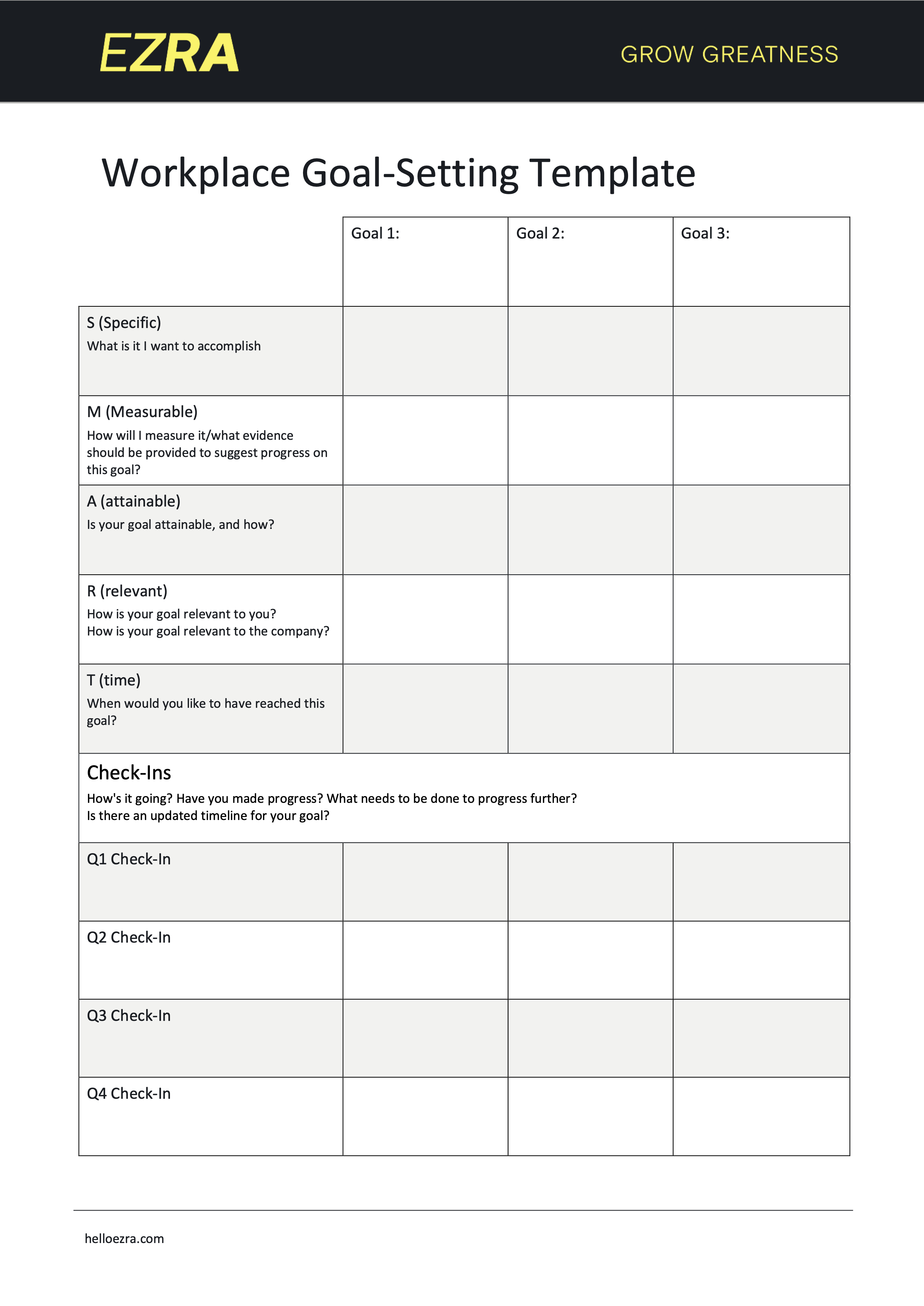Setting Goals in the Workplace (With Template)

We’ve all seen a shift towards hybrid working over the past couple of years and have probably all experienced it to some extent too. But it’s no secret many businesses and employees are still adjusting to this new way of working following the pandemic.
Setting personal and professional goals at work has always been particularly important in the workplace; it provides employees with developmental advantages, and when aligned with your company’s objectives it can be a terrific steppingstone to huge levels of growth for a business.
With the working ‘norm’ having been completely flipped on its head in just a few years, there’s no better time to be setting goals in the workplace.
What are work goals?
So, what are work goals? Think basic. They’re actionable steps that an individual or business can take to grow. Whether that be growing through career progression, increasing confidence and avoiding the dreaded workplace slump, growing company revenue, or expanding a business more generally. A goal could be as simple as increasing knowledge around a particular subject matter or completing training for industry specific software.
When it comes to employee work goals, it’s important to remember that setting smart, progressive goals is not only for your junior employees. Leaders and management need direction too, and if your business doesn’t think so, development isn’t going to come easy.
These goals might be slightly different, such as growing client bases, winning pitches, or setting precedents for workplace wellness, diversity, and inclusion, but they’re goals all the same. Every individual has the capacity for development and therefore every employee should have goals to grow; we’re all human after all.
Why is setting goals in the workplace important?
It’s easy to minimize setting goals to simply achieving the next ‘thing.’ But workplace goals have far greater advantages.
Employee Development & Direction
Goal-setting at work is a clear and measurable target and can act as an achievable mechanism for employees to reach and therefore develop at work. Not only do they provide a step towards development, but they can also act as a directive for many, so you’ll start to see greater focus and motivation; always a positive.
Knowing that you’re working towards achieving meaningful targets, no matter how small, can be incredibly stimulating. It can also act as a way of focusing on priorities and creating order to the everyday, increasing organisational skills along the way (Medlin, 2008) and boosting efficiency in the workplace.
So, start to get those goals down ‘on paper’ and monitor progress!
Even if you have a goal, without a clear plan on achieving this you can often digress. When a group went to set their own goals, the 76% who wrote those down (and had regular check-ins) successfully achieved them, whereas only 43% of participants who neglected these steps achieved their goals (Traugott, 2014). Those are huge differences!
Employee Feedback on Progress
Setting goals is also great for collaboration and communication between junior and more senior employees, especially when it comes to feedback.
Alongside measurable actions and targets, regular check-ins can play host to constructive criticism, guidance, and positive reinforcement. As a result, you’ll most likely start to see enhanced employee development and direction, and without it the chances of staff calling it ‘quits’ is going to be far higher.
It's also a pretty simple way that a company can provide support to its employees. Feedback is such a critical part of organizational improvement and setting goals is an easy start.
You've likely heard of SMART goals - focused goals standing for specific, measurable, achievable, relevant, and time-bound. They're a reason that they're so popular: SMART goals are an effective way of really measuring your success at work. Seeing your success first-hand is motivating and aids towards further development.
Business Development & Growth
More than 80% of 300 small business owners don’t keep track of their business goals. And they’re missing a trick! Setting — and more importantly tracking — goals, both by employees personally and by a business as a whole, can be crucial for business development and growth.
If employees are all working towards goals and targets, and more importantly achieving them, it’s inevitable that positive outcomes are going to be seen for the company as a whole too.
How to set up workplace goals? SMART goals
It’s very well talking about workplace goals’ benefits, but how should you be setting them?
Goal setting in the workplace needn’t be a chore. Something as simple as setting targets for the year with weekly, monthly, or even quarterly check-ins can have a huge impact on an employee’s career.
Use SMART goals to ensure that they’re realistic and achievable; an unrealistic goal or target can be disheartening when progression isn’t being shown.
Align these goals with the companies’ objectives; working towards the overall growth of the company can be a motivational factor for hitting targets.
Set weekly, monthly, or quarterly check-ins with managers and other colleagues to stay on top of your goals. This ensures the continuation of progression and means you’re less likely to digress from them. It also acts as motivation, direction, feedback, and a measurement of success.
Once a goal is completed, set a new one to continue your development!
Check out our free template for setting goals in the workplace and keeping up to date with your progress.
